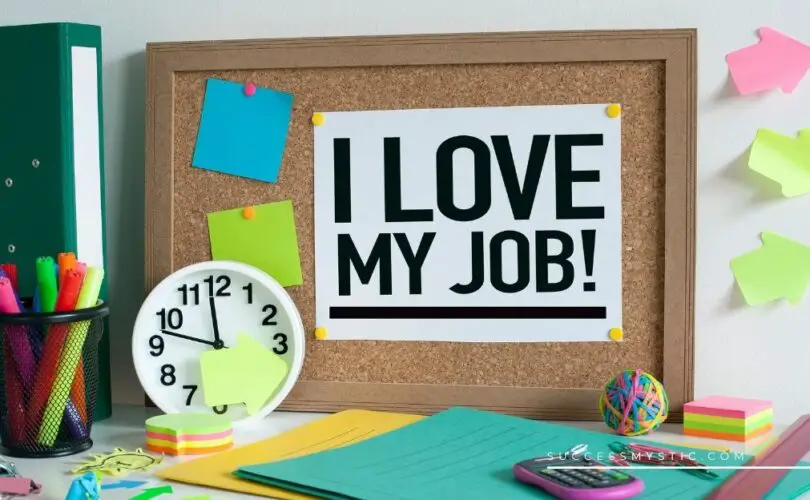As many as 90% of doctor’s visits can be attributed to stress or disorders related to stress. Studies show that many of the pressures that we face, thus the leading cause of stress, as Americans are related to our occupation (ref.).
Almost half of workers in the US find their job to be extremely stressful, while just short of 30% of American employees say they’re stressed at work often. Stress causes corporations billions of dollars every year. That’s due to missed work as well as the health care costs related to employees seeking professional help.
Yet, that doesn’t even begin to account for the hit productivity takes when people are struggling to cope with their stress levels. A lack of occupational wellness has steep penalties for everyone involved.
Forget the employer, though, your occupational wellness is about you. The anxiety and tension at work can creep into every aspect of your life.
What is occupational wellness? It’s the ability to strike a healthy balance between your leisure time and your working life.
100 Things To Do To Promote Occupational Wellness
You can do this by addressing the stress you experience in the workplace. Let’s take a look at 100 things you can do that will promote your occupational wellness.
Fitness Program
Ideally, your company will provide a gym on the site. However, if they don’t, it’s vital that you make time to exercise regularly.
What could be better for a healthy life balance than longevity and health? If your employer doesn’t offer any type of assistance, why not suggest it? They can make a great start with stress management workshops.
Flexible Working
In an ideal world, we can all telecommute and recapture our time. Unfortunately, that isn’t possible for everyone. However, if your work does offer an option to work from home, take it! It can provide you with a major productivity boost and allows you to take an emotional and mental break from the workplace.
Mindfulness
One of the most effective ways to manage your stress levels is with mindfulness. Not only can it help you remain focused on your daily tasks, but it can also help you boost your overall productivity. Mindfulness includes meditation and breathing.
Yoga
Yoga is similar to mindfulness, in that you focus on breathing. However, it is accompanied by long stretches that help tone your body and increase your flexibility.
An evening yoga routine can set you up for a great night’s sleep, which is bound to help you manage your stress levels. In turn, you can see an improvement in your occupational wellness.
Sleep
Since we’re on the subject of sleep… sleep is just as important as breathing, eating, and hydration. The average adult needs at least seven hours of sleep each night. If you aren’t getting that it’s having a knock-on effect on the rest of your day. It affects your decision-making process, your dietary choices, and your stress levels.
Parental Coaching
Family life is different these days, and new parents often struggle to integrate the stress of new children with their working life. If your employer doesn’t offer this type of coaching, you can check with your local community center to see what is available.
Sometimes it’s nice just to hear from other new parents who are experiencing the same struggles as you.
Financial Wellness
If the love of money is the root of evil, then the lack of or mismanagement of money is the heaviest burden. If you don’t address it, then it can interfere with your occupational wellness.
If you have money problems, you will likely overwork yourself trying to make up for the shortfall. It’s time to sit down and create a budget to help you manage your finances properly. When you look for jobs, make sure the benefits extend beyond a 401k.
Develop Your Emotional Quotient
Just sitting down and having a discussion or a workshop about emotional intelligence isn’t enough. You have to take action to improve your EQ, too.
It won’t just heighten your performance, it will also increase your productivity levels, thus reducing your overall stress in the workplace.
Learn to Improvise
Improv is a way to exercise your brain that includes a whole slew of helpful actions. It requires the ability to actively listen, collaborate with your colleagues, take risks, be more confident, engage in public speaking, and practice conflict resolution.
You can do this with your co-workers without them realizing you’re doing it. What will stem from it is a rapport that you didn’t have before. Ideally, you can get the buy-in of your colleagues.
Retirement
It doesn’t matter how old you are. It’s never too early to start planning for your retirement years. Plenty of employers provide coaching in that respect. Take advantage of it where it’s available. It can improve your efficiency while fostering your positive morale.
A Healthy Diet
Your diet matters, whether it’s at home or in the workplace. It all helps fuel your creativity, productivity, focus, and overall health. So, if your employer doesn’t have healthy food offerings available to you, be sure to pack your own.
Many employers are jumping on the bandwagon now, realizing that it’s a major opportunity to boost their employees.
Take A Break
While some people are lucky enough to score a power nap at work, for those of you who can’t it’s important to take regular breaks. If you can grab a nap, 20 minutes is more than enough to recharge your batteries. When you do take a break, be sure to step away from your work and take a walk.
An Hourly Walk
Take a walk every hour, on the hour. Speak to your manager and see if you can get the entire office in on the action. It’s a great way to collect your thoughts, and for your body to take a break from the strain of holding the same position as you work.
Practice Gratitude
Don’t underestimate the power of gratitude. It’s all about creating a strong sense of awareness about what you have, what you want, and how your decisions align with that. Gratitude can transform into accountability, which can trigger action.
Purpose
Most employers have programs that encourage their employees to engage in a bit of social responsibility. Are you involved? If not, it’s time to! There’s no point to any of this life if you have no purpose spurring you on.
Part of that means giving back. If your employer isn’t involved in any non-profits, find your own to partner with.
Community Engagement
Don’t be afraid to ask your employer to participate in community walks, whether it’s for breast cancer awareness or heart disease. Many businesses offer incentives to employees who join in community activities. So, why not take a look and find out if yours does. If not, you can ask them to sponsor you.
Walking Meetings
Encourage people to walk as they have small meetings. If it’s a group of a few, there’s nothing to stop you from taking a walk.
Goals
Hang a chart in your office and have a goal of the day, the week, and the month. Your daily goal could be to drink a certain amount of water. The week should be to take time to walk each day. Try to engage your co-workers, too.
Gym Discounts
Many employers work with local gyms to create corporate discounts. If yours doesn’t, then why not suggest it and find out who else in your workplace is interested? It could be a great way to foster relationships with your co-workers and keep your mind and body sharp.
Trade Equipment
Why not speak to your co-workers and find out who you can trade exercise gear with? If you can’t get to the gym, you might be able to create your own.
On-Site Gym
Alternatively, you may be able to convince your employer to provide you with the space necessary to bring your own gear. As long as you have a shower facility, they may just let you take 30 minutes out of your day to hit the gym. Once they see how productive you become, they’ll make more time for you.
Healthy Food
Not every employer has a cafeteria on staff, but many offer vending machines. If yours does, why not request that yours be stocked with healthy food? At the very least, they can increase the healthy options in the vending machine. That way, if you’re struck by the munchies you don’t have to be tempted by sweet treats.
Homegrown Exchange
At Christmas, people exchange cookies. Why not ask your colleagues who grow their own fruits and vegetables to trade? Everyone can bring it a healthy share of their harvest and make trades.
Hydrate
The ultimate number for water consumption is different for everyone. If you aren’t sure how much to drink, then you can easily work it out. All you need to do is step on the scale. See that number (in pounds)? Half it and drink that much water (but in ounces). If you live in a particularly hot area or you are more active than the average person, then you will need to increase that. Just, don’t wait until you’re thirsty to drink. Hydration is the key to focused thinking.
Relaxing Music
One of the best ways to de-stress is with some stress relieving music. You can keep stress at bay with some chill music at your desk. Most offices are fine with you listening to your headphones, as long as you don’t disturb other employees.
Always Eat Lunch
It isn’t just about taking the lunch break that is due to you, it’s about getting away from your workstation. Your brain needs the break while you enjoy a bit or nourishment.
Positivity
It can be incredibly challenging to remain positive in the face of stress in the workplace. However, adopting a positive attitude can help you battle the most stressful situations.
Quit Smoking
It might be one of the hardest things that you do, but it will be worth it. You might find that your employer provides programs or incentives to employees who drop the habit. The savings you make will make your new budget look much healthier.
Meetings
Encourage a stretch to start each meeting. When there’s a long meeting, encourage a break. People lose focus after listening to heavy information for long periods of time. In fact, 20 minutes of information is really the limit. So, a regular comfort break will make the meeting process more productive.
Connections
The people who are happiest at work don’t just enjoy the job that they do, they have also built strong relationships with their co-workers. Likewise, many people who are miserable in their workplace, are miserable because they don’t get along with their co-workers.
Prepare
How can you remain calm under pressure? You know that you have a major workday coming, an important meeting, an inspection or a presentation… how do you reach a place of Zen?
It’s especially challenging when your body wants to trigger a release of cortisol as though you are facing an angry beast that wants to eat you. The key is to be prepared. In the process of preparation, you achieve a confidence that will help you maintain your calm.
Meditation
Meditation is becoming a regular habit for many Americans, and it’s a seriously effective way to manage your stress levels. There are plenty of apps available to provide you with guided meditations until you are comfortable going it alone (or you can keep using an app, it’s up to you).
Pets
In an ideal world, your employer will trot out some therapy llamas for you and your co-workers to relax with. That is a rarity, even with the most forward-thinking businesses. However, don’t underestimate the stress relief that your pets at home can provide you.
Whether you live alone or have a family, there is nothing quite like having a pet greet you when you arrive home. Even if it is a cat that is only interested in you on its terms. You might just find your employer will be happy for you to use an app and check in on your pet from your desk.
Awareness
Part of thriving in work is thriving outside of it. Your workday, in reality, starts before you even walk through the front door. It starts the evening before your shift because it’s up to you to prevent the triggers of stress that will lead to a burnout. So, being aware of your body and mind is an important part of managing your occupational health.
Morale
Whether you do it on your own or your employers get involved, boost morale by celebrating success. If you want to help increase everyone’s morale, you may want to send everyone a celebratory email that highlights just what you have accomplished as a group.
Networking
Don’t be afraid to attend presentations and events that are hosted by professional organizations related to your industry or company. Not only can they spark your creativity, you just never know when you’ll get poached and dig your way out of a career rut.
Career Fairs
If you aren’t happy with your job, then it’s time to move on. You can start by attending any career fair you can find. It might not be a job switch that’s sufficient, you may need to launch a new career in a new industry.
Career Services
If you are struggling with your career, why not sit down with someone in career services. Talk about your values and discuss your ultimate goals. Do they align with the career you are currently in?
You may be better suited to a different role within your company. Or, you may need to look elsewhere to fulfill your career needs.
Hobbies
Occupational wellness isn’t all about what you do in the workplace. It’s equally important that you give your personal life sufficient attention.
One way to do that is to ensure that you make time for your favorite activities and hobbies. It’s so important to hold interests outside of your professional life. This is something that becomes even more apparent when you hit retirement, but don’t ignore your hobbies until then. Take your friend to a baseball game, go to the park and play chess, bake those sugar cookies, and join a community team. If you love it, make time for it.
Talk
If you have an interest in a different industry or career, get in touch with someone who does that job. Organize a meeting so that they can talk to you about what they do.
You can get a bit of insight into what they love about it, what isn’t so great, and the steps they took to get to where they are now. That should give you a better idea as to whether it’s the right move for you.
Transferable Skills
One of the biggest questions you face in any interview is what you can bring to the job. You can walk into a job that you don’t have any experience in if you can explain just how your behaviors and transferable skills can work for a new company. Don’t underestimate the power of your transferable skills, develop them.
Know the Signs
It’s so important that you know the typical signs that accompany fatigue and stress. Depression and anxiety are all symptoms of a professional burnout.
Other burnout signs include a lack of engagement in activities at work that they generally were interested in. As well as feeling like a failure.
A burnout is when someone can no longer function effectively in their workplace. It all comes down to chronic stress. So, knowing those signs is important for your overall occupational wellness, but it can also be a benefit to others who may be experiencing these symptoms.
Self-Care
Exercise, healthy diet, great sleep, and hydration… all of these are basic acts of self-care. A lot of people think of self-care as a pedicure, and while they indulge that they fail to do the literal basics. Don’t neglect any aspect of self-care.
Accurate Goals
Everyone wants to have a sense of purpose. A greater meaning to life. Taking the time to get a true understanding of your own purpose is one efficient way to ensure your career goals line up.
Working in a job just because it’s a paycheck can be soul destroying. So, if you struggle with work-life balance, it may be time to ask yourself whether your career really lines up with your goals.
New Skills
Every day really should be a school day. So, don’t just stick with what you know. Push yourself constantly to learn more, and build your skills. That way, you will continually add value to your company. You will also make yourself a more attractive prospect to other businesses if you choose to make a move.
The Work-Life Balance
If you were to take a poll of every American right now, the vast majority of them would likely tell you they wish they could spend more time with their family and friends.
The ultimate aspect of occupational wellness is striking a work-life balance that you are truly happy with. With the change in schedules these days, it’s challenging to get days off with your partner, to make time to catch your kid’s activities.
It’s easier to achieve the balance when you ensure you are taking care of yourself first. Put your own mask on before you attempt to help others.
Communicate
If you feel as though your employer is taking advantage of you, communicating that is so important. It allows you to negotiate your working hours and workload, with your bosses and your colleagues. You might think you’re communicating effectively, but if you’re approaching a burnout, then you’re not.
Assert Yourself
A big part of the communication process is the ability to assert yourself. True assertiveness allows you to communicate your feelings and ideas without disrespecting that of others. Don’t confuse assertiveness with aggressive communication.
Personality & Work
Many people take a personality test to determine their type and their working style. It’s a really efficient way to match employees with the right work for them. For example, you wouldn’t want an introvert doing all the one-on-one sales work while an extrovert is tucked away doing lone work.
Why don’t you take a personality test to see whether your current career really matches who you are as a person? It might not be a perfect system, but it could help guide you to important realizations about you personally and your career.
Optimized Setting
Take a look at your office environment. What is increasing or decreasing your satisfaction, therefore impacting your productivity? There are plenty of issues that could be at play. Temperature is a big one.
There is nothing worse than being too warm or too cold. What about limited interaction with colleagues, safety hazards, time-wasting meetings or endless distractions?
No Settling
Maintain your motivation, keep pushing toward new goals and never settle.
Knowledge Booster
When you set a new goal, do whatever it takes to achieve it. Don’t just set goals within your comfort zone, push yourself to expand your knowledge.
The Positives
Not everyone will get to do their dream job. Otherwise, there would be a lot more rock stars out there. So, when you find yourself getting frustrated you would do well to make a list of the positives and benefits of your current position.
Enjoy
When you find a way to enjoy your job, you ensure that you are doing what you enjoy.
Connections
Not only should you work hard to foster strong connections with your immediate co-workers, but you should also get to know others in the office as well. You can play a major role in boosting everyone’s morale, whether it’s the cleaning crew or a visitor from another branch.
Record Your Goals
You should always have a list of goals that you are working towards. Don’t just write the list, though, you need to create a proper plan that will help you execute them.
Lighting
Many offices and businesses have fluorescent lighting. This only increases anxiety and stress. It can also cause sleep problems, headaches, and migraines, as well as eye strain.
If you can convince your employer to make these types of changes, you will see a boost in your productivity and wellness.
Plant Life
Plants are great for reducing stress (they also boost the quality of air), so if your office is lacking in greenery, bring in your own.
Most bosses won’t mind if you decorate your office, cubicle or workstation with some potted plants. It can also reduce the noise level in an office, which is going to help you feel more relaxed.
Color Scheme
Do you ever feel like climbing the walls of your workplace? That might just be down to the paint job. Okay, so you probably don’t have much say over what color the walls are. However, you can use accessories to incorporate some more calming colors that will help you decrease your stress.
Ergonomics
Having the right tools can help you decrease stress and stave off typical work-related injuries (think back problems and repetitive strain injuries). You can invest in ergonomic keyboards, chairs, and even the computer mouse.
If your employer isn’t willing to make those purchases, it may be worth your while making the investment yourself.
Technology
Have you ever struggled to push an email through? Spent hours on the phone to IT because your system isn’t working? Inefficient technology in the workplace can be a major source of frustration. In fact, in the movie Office Space, the major duel was between the office workers and a printer.
It isn’t just the frustration that it causes, it slows your workday down and increases your workload. When you’re faced with inefficient technology it just makes your job harder.
Don’t be afraid to raise issues with your work tools. Do you think a construction worker would put up with a broken hammer? Or an electrician would be happy with the wrong screwdrivers?
Do You Enjoy Work?
Ask yourself whether you actually enjoy heading to work? Not the odd off day, but whether most days of the week you enjoy your job. Is your workload manageable?
If you are experiencing an issue, do you feel comfortable raising it with a co-worker or your boss? If the answer is no, then you need to make a change for the good of your occupational wellness.
Daily Activities
Does your job engage you? Does your work enrich you? Are you completely engaged with your set of daily tasks? If not, then what are you doing with your life?
Workload
Beyond a manageable workload, another important question to ask is whether you have the tools that you need to get through that workload. If you don’t, your employer is selling you short.
Not only will you struggle to turn in your work on time, but it will only increase your stress levels. So, you have to either ask for those tools or look for a new job.
The Ultimate Balance
The ultimate goal for all of us is to have a healthy balance between family time, self-care, work, fun, and alone time. If you feel lacking in any of these aspects, then you need to reassess your situation.
Motivation Levels
Are you excited to tackle your tasks when you wake up in the morning? Do you enjoy the knowledge that you need to do your job? It makes a difference to your motivation and your overall happiness.
Challenged
Do you feel as though your job challenges you? There is nothing worse for occupational wellness than feeling stagnant.
Recognition
You may want to go out of your way to recognize the work of others because it fuels you, you can fuel others. Hopefully, you will prove as a role model and people will offer you the same in kind.
Fair Compensation
Some people are completely focused on their careers and they don’t mind an excessive workload if they are being fairly compensated. Likewise, it can be incredibly frustrating to be worked incredibly hard and feel as though you aren’t compensated fairly.
So, don’t be afraid to ask for a raise if you feel you’re worth it. Just be sure to highlight the value you add to your company when you do it.
Learn To Handle Criticism
Okay, nobody enjoys hearing negative comments about themselves. However, part of building strong relationships in the workplace is learning how to deal with criticism.
Anger may be a normal reaction, often some blame game follows, but learn how to override that reaction and take criticism with a grain of salt. Maintain eye contact, ask how you can do better, and then go and apply it. Remember, it’s not personal.
Conclusions
Never jump to conclusions before you have all of the relevant facts and information. It often leads to an overreaction which spirals into misunderstandings. Don’t react, respond.
Conflict Resolution
As soon as a negative situation arises, deal with it immediately. It will only get worse if you allow it to fester. So, be courteous when you resolve the conflict, but be direct.
You may want to create a plan before you go to speak to someone. Ideally, you will resolve any issues with your co-workers without needing to involve your bosses.
Boundaries
It’s great to build strong friendships with your colleagues, it’s a normal part of the process. After all, you likely spend more time with them than anyone else. However, your friendships shouldn’t interfere with the job. So, even if you work with your best friend you shouldn’t let it interrupt your focus.
Respect
You will never love everyone you work with. It’s only natural that there will be at least one person that drives you around the bend. Still, ensure that you treat all of your colleagues with respect. You can be honest without being cruel.
Limited Interaction
While it’s important to treat everyone with respect, it’s also important to limit your interaction with the people who steal your time and energy.
Secrets
If there is someone you dislike, don’t share it with everyone else. Don’t cloud that person’s reputation with others just because of your own problem. Remain civil. If they are actively undermining you, then you can take it to your supervisor.
Strength in Diversity
We all have different perspectives, and you will do well to accept that we don’t all need to agree on every little thing. So, if you’re struggling to agree with someone, try to look at the situation from their view.
Intimacy At Work
While romances in the workplace are impossible to avoid, you should ensure that if you do engage in an office romance you realize that it can cause you issues down the road and that when you step through the front door of your workplace, you should have your professional cap on. Outside relationships cease to exist.
The Burden Of Your Home Life
It’s yours and you should do your best to leave it at the door. While there may be people who you confide in, you don’t want to burden everyone with your personal problems. It may lead them to avoid you. Worse, it might make others feel uncomfortable. It will absolutely impact your work rate.
Control Your Emotions
Don’t ignore them, just learn how to stay calm and hold your temper, even if someone is being rude.
Don’t Gossip
Gossip is a form of negativity, and you may love to fill your time by gossiping at the water cooler, but it breeds distrust. You should deal with your own business and let them deal with theirs.
Realistic Lists
One of the most effective ways to manage your stress and workload is to create a realistic to-do list. Write the list out in order of their priority.
An Organized Workspace
Nothing is more frustrating than an untidy workspace. So, take a moment to organize your desk before you leave each night. It will allow you to start each workday positively. It also means you can easily find exactly what you need when you need it.
Classes
If you want to change your career or advance in your current one, then check out relevant classes. Do more by learning more.
Miniature Goals
Don’t get caught up just on your ultimate goal, ensure you have mini-goals to work toward in the meantime. It will help you maintain your motivation at work.
A Personal Touch
Inject a bit of your personality and home life to your working area by bringing in some personal touches. Any type of personal touch can help you stave off stress and improve your productivity.
Future Planning
Sure, in a perfect world we would all walk into our dream jobs. Even people who get the right training and education don’t do so easily. Plan for your future, make a plan, set deadlines, and fight for the career that you want.
Connections
When you run into trouble at work, you should always know who you need to call. Whether it’s your boss to deal with an issue with a co-worker or a colleague who can assist you. Creating strong connections will ultimately make your working life much easier to navigate.
Take The Stairs
Instead of taking the elevator, skip it and go for the stairs. It will help you get in a bit of extra exercise and keep the blood pumping to your brain!
Eye Strain
If you spend your day at a computer, take steps to combat eye strain. You can adapt your screen color for specific times of day, dim the screen to make yourself more comfortable, and take regular breaks to rest your eyes. Eye strain can cause headaches, as well as fatigue.
Flu Shots
Do yourself a favor – get a flu shot, and encourage your co-workers to do the same. The holiday season is one of the most stressful times of the year, no matter what industry you work in. No one needs half the office getting wiped out by the flu.
Employee Survey
If your employers won’t survey you, perhaps you could hold your own survey and simply provide them with the results. Do it to determine what really works for people and what is causing them stress and anxiety in the workplace.
Scheduled Breaks
When you sit down and make your to-do list for the day, be sure to include your break times. Don’t just get your phone out and check up on social media. Go outside and get some fresh air!
Hourly Breaks
Ideally, a 5-minute break every 60-90 minutes is the best way to boost your focus. If you’re the boss, you can set this as a rule for the entire office. If you’re not, well… use your powers of persuasion to show your boss the benefits.
Flexible Hours
If your job offers flexible working hours, then you need to take advantage of them! Once upon a time, a 9-5 was considered the ideal. There aren’t too many of those left.
Even so, many employers will allow you to structure your workday to suit your lifestyle. If your company doesn’t, then you might want to look for a new job.
Laugh
Not live, laugh, love… just laugh. It’s the best medicine and it’s a great way to reduce stress levels and boost everyone’s mood, including your own. So, take every opportunity you get to have a laugh with your colleagues.
Limits
Let everyone in the office know that you only check your emails at set times. That should help reduce distractions from your workday and manage your stress levels.
Even better if you can get everyone in the office to get on board with the idea and do the same. Why not speak to your boss about limiting unnecessary meetings, too?
A Morning Huddle
A lot of companies hold a morning huddle in each department. It’s a chance to set the main goals for the day, as well as inform each other of what’s going on. It can help start everyone’s day on a positive note. It also removes the need for sit down morning meetings and a flurry of emails.
Thanks
Take time out to thank one of your co-workers each day, whether it’s for making the morning coffee, turning up with bagels or for helping you hit a deadline.







